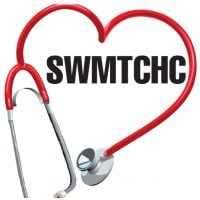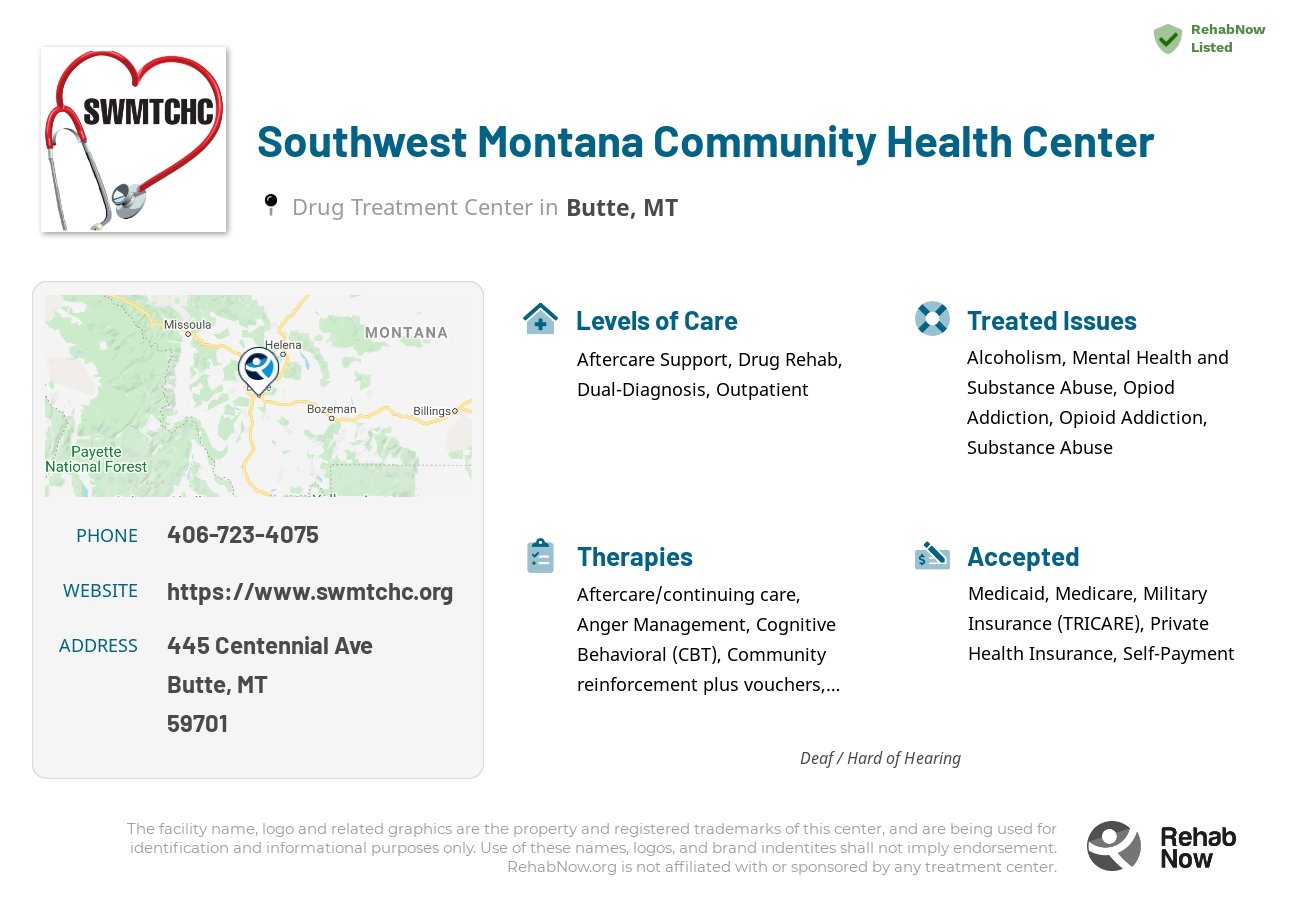Southwest Montana Community Health Center
Drug Rehab Center in Butte, Montana
Southwest Montana Community Health Center (SMCHC) is a trusted provider of comprehensive and compassionate addiction recovery services, offering individual and group counseling, medication management, and aftercare support, as well as specialized dual-diagnosis care to treat mental health disorders affecting addiction recovery and accepting private health insurance payments.
About This Butte, MT Facility
Southwest Montana Community Health Center in Butte, Montana is a treatment facility dedicated to helping individuals struggling with alcoholism, opioid addiction, substance abuse, dual diagnosis, drug addiction, and mental health issues. Their facility offers a range of services and treatment options for those seeking help in overcoming their addiction and achieving sobriety. With a focus on personalized care, Southwest Montana Community Health Center aims to support individuals throughout their recovery journey by providing services that cater to their specific needs and circumstances.
The center offers various treatment methods to address addiction and substance abuse. They provide outpatient levels of care, allowing individuals to receive treatment while maintaining their daily routine. Southwest Montana Community Health Center also specializes in dual diagnosis treatment, acknowledging the relationship between addiction and mental health. Additionally, they offer aftercare support to ensure continued success in recovery. By utilizing a holistic approach and evidence-based practices, the center strives to provide comprehensive care that addresses both the physical and psychological aspects of addiction and promotes lasting sobriety.
Genders
Ages
Modality
Additional
Conditions and Issues Treated
Rehab centers exist in Butte, MT to help individuals bounce back from substance abuse, which is an umbrella term for drug and alcohol addiction. Drug addiction refers to the use of illegal drugs and improper use of prescription drugs. Centers like Southwest Montana Community Health Center provide individuals a chance to access individual and group therapy that can be monumental for recovery.
Substance abuse includes all problems that stem out from using various psychoactive substances. It is also a diagnostic term used by Diagnostic and Statistical Manual of Mental Disorders (DSM-IV) to define the mental and physical impairment or distress caused by misuse and overuse of certain substances in a period of 12 months.
Opioid addiction involves addiction to legal or illegal opioids. It may happen very quickly with any opioid use. Sometimes within a matter of days. Opioid addiction is a known as a high-risk factor for future heroin addiction.
Opioid withdrawal can be extremely uncomfortable and lead the user to continue to use even if they want to quit. Stopping using an opioid requires careful medical observation. Sometimes the withdrawal can persist for many weeks, which can put the user at a high risk for relapse.
It is recommended to receive inpatient treatment and a medically supervised detox like those offered at Southwest Montana Community Health Center in Butte, MT, MT, to manage the withdrawal process while learning lasting tools to maintain recovery. In some circumstances medications can be used to manage opioid addiction.
Substance use disorder falls under two categories: Alcohol or Drug Abuse and Drug Dependence. An individual suffering from a substance use disorder and mental health disorders is said to have a co-occurring disorder or a dual disorder. Individuals in Butte, MT with substance use disorders and mental health problems are said to suffer from a ‘dual diagnosis’.
The most frequently identified mental health issues found in individuals with substance use disorders include anxiety, depression, schizophrenia, and schizoaffective disorder.
Levels of Care Offered
This center offers a variety of custom treatment tailored to individual recovery. Currently available are Aftercare Support, Drug Rehab, Dual-Diagnosis, Outpatient, with additional therapies available as listed below.
Outpatient treatment is treatment that occurs when a patient is not checked into a rehab facility. The patient may show up for therapy sessions, go through detox and engage in other therapies to help them recover. However, they will do so while they live at home in Montana.
Outpatient therapy provided by Southwest Montana Community Health Center is usually recommended as a follow up to inpatient therapy. It helps patients adapt to their normal lives after treatment. In some cases, it can also be an alternative to inpatient treatment. People may choose this route if they are unable to leave their jobs, children or if they don’t have the money for inpatient treatment. However, inpatient treatment is the best way to recover from addiction.
Aftercare support involves the support given to a Butte, Montana patient after they complete treatment. It helps them adjust to normal life. It may include setting them up in a halfway house and enrolling them in programs like Narcotics Anonymous (NA) and Alcoholics Anonymous (AA). Southwest Montana Community Health Center‘s patients may also be provided with career training to help them get back into the job force.
Southwest Montana Community Health Center‘s Therapies & Programs
Individual therapy aims to identify the core issues that would have led the patient to substance abuse and address the root cause effectively. Patients find the therapist as a person who they can trust. It helps them to open up and discuss personal and sensitive issues, which they may not be comfortable discussing in a group.
Couples therapy is an approach wherein the patients and their partners are engaged together as a part of the treatment process. When a person becomes a victim of substance abuse, it affects the patient and the people around him, particularly his partner. Their relationship can become strained due to lack of communication, financial issues, loss of trust, lack of intimacy, and physical abuse in more severe cases.
Couples therapy addresses these issues and tries to rebuild the trust between the partners. The partner’s involvement in the process will result in greater chances of treatment success and sustained recovery.
Family therapy is a set of therapeutic approaches that assumes that the entire family is a system. It utilizes the strengths and resources of the family to help the patient refrain from resorting to substance abuse. It helps to repair relationships and improve communication between family members.
Group therapy happens at Southwest Montana Community Health Center in a controlled group environment, as opposed to a one-on-one setting. It supports Butte, MT patients’ recovery by offering a sense of comfort and letting them know that they are not alone. Through shared conversations, patients also learn to develop faith and understanding and gain insight on their addictions.
Unresolved trauma is often a key reason why many patients resorted to substance abuse. Trauma therapy refers to treatment wherein specialist therapists help the patients to resolve the trauma that led the patients to substance abuse. The trauma could be physical abuse, sexual abuse, war, natural disasters, divorce, accident, loss of a loved one, etc. Thinking of these traumatic events causes emotional disturbances like anxiety, depression and results in addiction. If trauma is the primary cause of substance abuse, then both issues must be addressed. Otherwise, there is a risk of relapse. Trauma therapy also improves the cognitive functions and provides long term benefits.
Dialectical Behavior Therapy (DBT) is an improved version of Cognitive Behavioral Therapy (CBT). DBT is a treatment of choice for people suffering from self-harming behaviors characterized by cutting and suicidal thoughts or inclinations.
This treatment is developed to help individuals recognize their thought patterns, behaviors, and feelings. It has demonstrated its effectiveness for people that are finding it difficult to control their emotions and urges. Conditions such as obsessive-compulsive disorder and borderline personality disorder also benefit from DBT as it imparts individuals stress-management techniques and enhanced self-esteem so they can sustain their sobriety by reducing the impact of triggers and out-of-control emotions.
Cognitive behavioral therapy (CBT) is a way of addressing concerns through talking. It can be used in individual counseling sessions. Talking through issues with professionals at Southwest Montana Community Health Center can identify sources of discomfort or unhealthy thoughts. It is a way of learning about yourself and your individual perceptions. CBT is a healthy way of addressing some behaviors which may be bringing unintended consequences in your life.
Contingency management is a way to help motivate someone to remain substance free. It is a process of rewarding positive choices and good outcomes. As humans we are wired to recreate experiences that lead to positive feelings. Through this method incentives are used for completing positive steps towards a sober life. This may be a reward for attending meetings, remaining sober or for employment goals.
Patient Experience
Experiential Therapy at Southwest Montana Community Health Center
Experiential therapy works on the principle that the perception of individuals determines their behavior. It is different from medication and talk therapy and suits those who have difficulty in expressing themselves and interact. Experiential therapy works by using tools and activities to recreate past experiences and encourages the release of suppressed thoughts that were responsible for the negative feelings and drug addiction.
Role-playing, arts and crafts, music, animal care, rock climbing, etc. are some of the activities used in this therapy. Gradually the individual will experience calmness and love and change their perception positively. Other than drug addiction, Experiential therapy is useful in various behavioral and eating disorders.
Payment Options Accepted
For specific insurance or payment methods please contact us.
Is your insurance accepted?
Ask an expert, call (888) 674-0062
Additional Details
Specifics, location, and helpful extra information.
Butte, Montana 59701 Phone Number(406) 723-4075 Meta DetailsUpdated November 25, 2023
Staff Verified
Patient Reviews
There are no reviews yet. Be the first one to write one.
Butte, Montana Addiction Information
Montana has one of the highest rates of drug and alcohol abuse in the nation. More than 280,000 of its residents engage in drug or alcohol abuse every year. Marijuana, in particular, is heavily used among high school students. Despite these daunting trends, the state is grappling with the issue head-on.
Drug addiction is a serious problem in Butte, Montana. In Butte specifically, in 2015, there were 3 overdoses due to opioids and 11 overdoses due to other drugs. From 2015 to 2016, the number of opioid prescriptions increased by 18%. There are many drug and alcohol treatment programs in Butte that can help you recover from addiction, and there are also many support groups and sober living homes available.
Treatment in Nearby Cities
- Broadus, MT (346.5 mi.)
- Lame Deer, MT (284.4 mi.)
- Lewistown, MT (165.4 mi.)
- Lolo, MT (90.3 mi.)
- Glasgow, MT (316.8 mi.)
Centers near Southwest Montana Community Health Center
The facility name, logo and brand are the property and registered trademarks of Southwest Montana Community Health Center, and are being used for identification and informational purposes only. Use of these names, logos and brands shall not imply endorsement. RehabNow.org is not affiliated with or sponsored by Southwest Montana Community Health Center.


